8 Aug, 2021
Get short URL
© Ruptly
Greece continued to battle major wildfires on Saturday, with the flames coming dangerously close to the capital, Athens, and cutting the country’s second-largest island, Evia, in half, leaving the sea as the only escape route.
Dramatic drone footage of Evia from RT’s Ruptly video agency shows vast tracts of forest still engulfed in flames or burned to the ground. The blazes were so huge, they separated the two halves of the Aegean island, which has a population of 200,000.
© Ruptly
Firefighters working throughout the night to save Istiaia, a town of some 7,000 in the north of Evia, and several nearby villages. They used bulldozers to open clear paths in the thick woods to act as a firebreak.
Six aircraft, four helicopters, 475 firefighters and 35 ground teams have been deployed on the island, according to Civil Protection Chief, Nikos Hardalias, with firefighters from Romania and Ukraine aiding their Greek counterparts. The military also sent 84 special forces troops to assist in tackling the blaze.
Some 1,400 people were taken off the island by boat on Friday, after the approaching wall of fire left them with no other means of escape. A flotilla of 10 vessels, including coastguard ships, ferries, and fishing boats, has now been assembled in case a second evacuation of residents is required, a coastguard spokeswoman told the AP news agency.
On the mainland, the wildfires, pushed by strong winds, have reached the suburbs of Athens, and a huge plume of black smoke hangs over the city. A special hotline has been set up in the city to offer advice to people suffering breathing problems.
© Ruptly
The evacuation of residents was ordered in the nearby town of Thrakomakedones on Saturday, with video footage showing burnt homes and cars. Fires also raged on the southern Peloponnese peninsula, near Ancient Olympia, and in Fokida, in the center of the country.
Numerous wildfires took hold across Greece at the beginning of the week, as it endured its worst heatwave in decades, with temperatures reaching 45C (113F). The fires spurred large-scale evacuations, burnt forest land, and destroyed farms and homes. One volunteer firefighter died on Friday, and 20 people have required hospitalization.
Greek Prime Minister Kyriakos Mitsotakis said his country was experiencing a “nightmarish summer.” He said providing aid to those affected by the disaster was his “first political priority” and promised that the affected areas would be restored.

Leftist groups call for volunteer effort, slam underfunding as wildfires spread across Turkey, Greece
Extreme weather conditions due to global warming and flawed preventive policies by the governments concerned are said to be the reasons for the extensive spreading of wildfires throughout the Mediterranean
Wildfires charged by protracted heat waves and strengthening winds have spread extensively throughout the Mediterranean regions of Turkey and adjacent parts of Greece this week, causing serious damage to forests, wildlife, people and property. The blaze, which started in the Manavgat and Antalya regions of Turkey last week, has now spread to other areas in the country, including Muğla, Adana, Osmaniye, Mersin and Kayseri. In Greece, fires are on in the outskirts of Athens, the southern Peloponnese region, Evia, and several Aegean islands. Major drives to extinguish the fires and evacuate people are underway in both countries. Parts of Sicily in Italy, North Macedonia and Albania have also experienced wildfires this season.
According to reports, extreme weather conditions characterized by a historic rise in temperature and dryness in the region has resulted in the extensive spreading of wildfires in the Mediterranean region of Turkey and adjacent areas in Greece. While wildfires are not new to the region, the extent and pace of the current spread is being regarded as the worst in the recent history of the region. Preliminary studies suggest that drastic changes in the climatic pattern have led to this catastrophe in this part of Europe while heavy rains and flash floods were experienced in other parts of Europe earlier in July.
Concerned sections in both Greece and Turkey claim that along with climate change, the lack of planning, underfunding of preventive mechanisms, flawed disaster management plans, and short sighted policies of governments in the region are also responsible for the extent of damage caused by the wildfires.
The Communist Party of Greece (KKE) stated that “extreme weather phenomena” and “climate change” are used as a convenient excuse and “protection” to hide the “long-standing shortcomings, under-staffing and underfunding of services, inadequate resources and infrastructure, and the lack of preventive measures.”
“Plans and measures for fire, flood and earthquake protection are not a luxury. They concern human life, the protection of the natural environment and the needs of the people, but they are not implemented because they are of no profit to the capitalists and the bourgeois state. It is the same policy that undermines the rights of workers and of the people as a whole. It is therefore necessary to demand a radically different development path that does not serve profit, but the needs of modern people,” said the KKE.
The KKE and the Communist Party of Turkey (TKP) have called on their cadres and members of their mass organizations to volunteer relief and rescue activities in the regions affected by the raging wildfire.
Photo: Wildfire blazes near the Greek town of Afidnes. (source: 902.gr)
This article was published on 6 August at Peoples Dispatch.
The Barricade is an independent platform, which is supported financially by its readers. If you have enjoyed reading this article, support The Barricade’s existence! See how you can help – here!
Firefighters tackle blazes on two fronts on Evia as heatwave-driven devastation across southern Europe continues
00:51 Sky glows red over ferry evacuating people from Greek island fire – video
Jon Henley, Bethan McKernan, and Helena Smith in Athens
Sun 8 Aug 2021 18.50 BST
Thousands of people have fled wildfires that are destroying vast swathes of pine forest and razing homes on Greece’s second-largest island, Evia, as devastating summer blazes rage from southern Europe to Siberia.
“We have ahead of us another difficult evening, another difficult night,” Greece’s deputy civil protection minister, Nikos Hardalias, said on Sunday, adding that nearly a week after the blazes started, strong winds were driving two major fire fronts in the north and south of the island.
Seventeen firefighting planes and helicopters were in action on the island, just north-east of the capital, Athens, where fires in a northern suburb and the nearby Peloponnese region were stable, although the risk of rekindling remained high.
Wildfires have devastated large areas in southern Europe for a fortnight as the region endures its most extreme heatwave in three decades. Ten have died in Greece and Turkey, with many admitted to hospital. Italy has also suffered million of euros of damage.
Huge fires also have been burning across Siberia in northern Russia for several weeks, forcing the evacuation on Saturday of a dozen villages. Wildfires have burned nearly 6m hectares (15m acres) of land this year in Russia, while hot, dry and windy conditions have also fuelled devastating blazes in California.
Rain eased the situation in Turkey over the weekend, but record temperatures, linked by experts to the climate crisis, continued unabated in Greece, where a helicopter airlifted an injured firefighter from Mount Parnitha, north of Athens, on Sunday.
The coastguard has evacuated more than 2,000 people by sea, including 349 on Sunday morning, from densely forested Evia, a popular summer holiday destination, and ferries stood by for more to be taken off as the inferno forced authorities to order residents to leave several dozen villages.
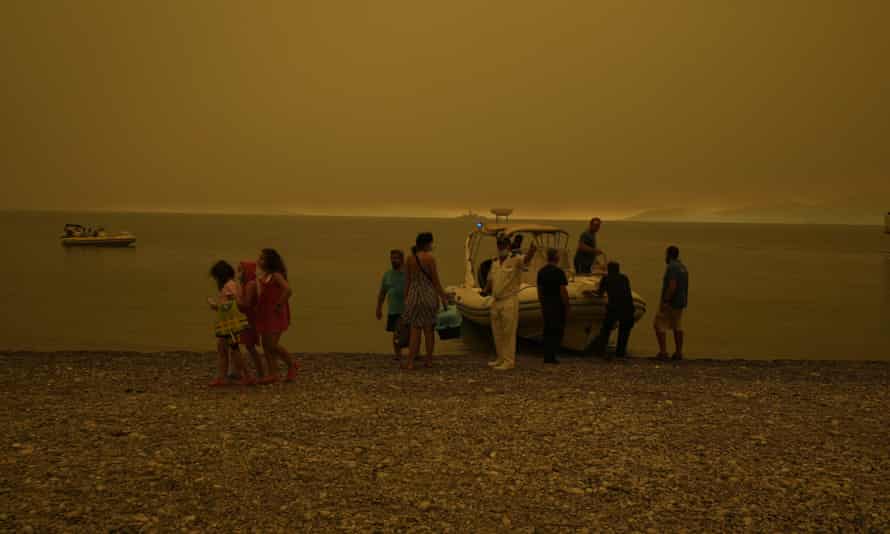
A further 23 people trapped on a beach were rescued by a Greek coast guard boat patrolling Evia’s shoreline late on Sunday. With temperatures as high as 45C (113F) and conditions bone dry, the coastguard said three patrol boats, four navy vessels, one ferry, two tour boats plus fishing and private craft were ready to evacuate more people from the northern seaside village of Pefki.
“I feel angry. I lost my home … nothing will be the same the next day,” Vasilikia, one resident, told local journalists onboard a rescue ferry. “It’s a disaster. It’s huge. Our villages are destroyed, there is nothing left from our homes, our properties, nothing.”
As 260 firefighters from Greece and 200 more from Ukraine and Romania battled the flames, young people carried old and infirm residents to safety across the sand. Others fled their villages on foot overnight amid apocalyptic scenes.
The heat was so intense that water evaporated before reaching the fires, witnesses said. The governor for central Greece, Fanis Spanos, said the situation in the north of the island had been “very difficult” for nearly a week.
“The fronts are huge, the area of burned land is huge,” Spanos said. More than 2,500 people have been accommodated in hotels and other shelters, he said. Greece has deployed the army to help battle the fires and 10 countries including France, Egypt, Switzerland, Spain and Britain have sent help including personnel and aircraft.
Hardalias said conditions on Evia were particularly tough for the firefighting planes and helicopters, whose pilots faced “great danger” with limited visibility, air turbulence and strong wind currents from the fire, he said.
On Sunday, Serbia announced it was sending 13 vehicles with 37 firefighters and three firefighting helicopters to Greece, where over the past 10 days 56,655 hectares of land have burned, compared with an average between 2008 and 2020 of 1,700 hectares.
The causes of the fires are being investigated, with several thought to have been started deliberately. A Greek police spokesman, Apostolos Skrekas, said 10 people, including a 71-year-old man in the Peloponnesean region of Messinia, had been arrested on suspicion of arson; a further nine were being questioned. Five hundred police had been sent to monitor areas where fires had been put out, he said.
Many villages on Evia had been saved only because young people had ignored evacuation orders and stayed behind to keep the fires away from their homes, Giorgos Tsapourniotis, the mayor of Mantoudi on Evia, told local media.
Many villagers criticised the authorities response. “The state is absent,” one village from the north of the island, Yannis Selimis, told Agence-France Presse. “For the next 40 years we will have no job, and in the winter we are going to drown from the floods without the forests that were protecting us.”
In Turkey, firefighters earlier described the herculean efforts many had put in. Günaydın Sözen, 48, of the Istanbul fire service, told the Guardian that he had been a firefighter for 21 years but had never been called to battle a wildfire before.
He said he and 24 departmental colleagues had helped fight a fire near the Kemerköy thermal plant in Muğla province for five days, “working day and night … the area of the fires is so big it’s created its own climate and the sea air makes more wind that actually makes it flare up even more”.
Sözen said the fire acts “in a different way, because of the olive trees. They are very oily, so hosing the bark is not enough – they burn on the inside, because of the oil, so we have to get close enough to run the water down the trunk from the top”.
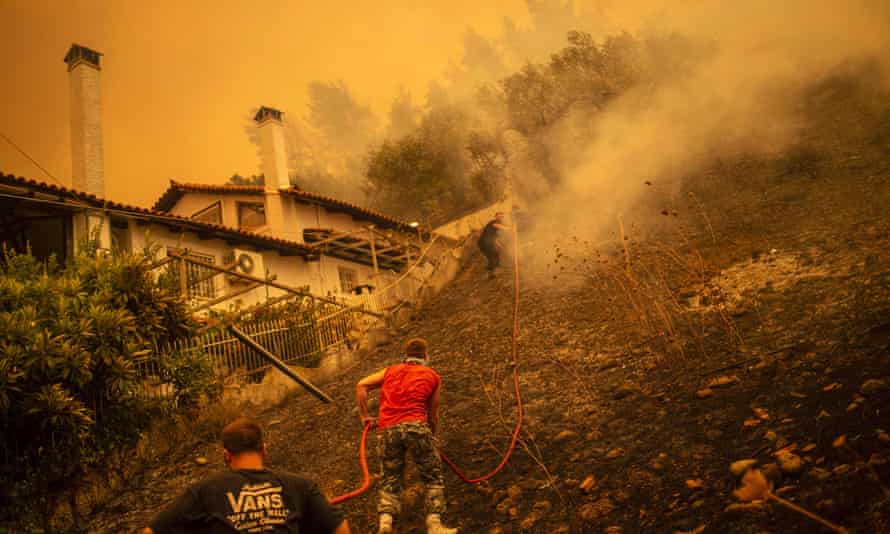
Local people had been “a massive help”, he said, bringing everything from food to cold water to clean shirts. But his team had “seen so many dead creatures, lizards, everything you can think of”, he said. “We saved a tortoise.”
Yusuf Doğan Gürer, 36, deputy head of the Avrupa Yakasi (European side) Istanbul fire department, said the firefighters had pushed their vehicles and their own bodies to the limit to try to get as close to the fires as possible.
“You need to be in good physical condition, much more than what we are used to in the city,” he said. “We had to evacuate the area three times – that has never happened before when we work anywhere else. Once, we got stuck inside the flames.”
The experience had been hard, he said, but had “taught us a lot. The way the flames move, and how fast they move, are things we need to adapt to. Phones are not working properly, so coordination is hard. We will stay here as long as we are needed.”
Agence-France Presse, Reuters and Associated Press contributed to this report
Issued on: 08/08/2021

Gouves (Greece) (AFP)
A police car siren calls for the last residents of the village of Gouves on the Greek island of Evia to evacuate as fire rages down a mountainside and engulfs the first houses.
"I don't want to, I don't want to," repeats in sobs a woman on her porch who cannot find the strength to flee even as the approaching inferno turns the sky orange.
The fires remained out of control over large swathes of Evia island on Sunday, as evacuations were continuing, pushing hundreds of people towards the beach.
Many villagers joined the battle, and around 10 men were busy digging, cutting and pulling out branches in an effort to slow the raging fire despite the repeated urging of police to leave.
Forming a human chain, they unrolled water hoses fed by agricultural pick-ups, desperate to save their livelihood.
"If people leave, the villages will burn for sure," says Yannis Selimis, a young man from Gouves. "We are in the hands of God."
Tempers flared over a lack of government response.
"Which authorities? Which firefighters? Do you see anybody here?" exclaims one local.
"They burnt our paradise," says Triantafyllos Konstantinos, 46. "We are done," he sighs.
"It's tragic. We are all going to the sea," says Nikos Papaioannou as the fire steadily encroaches on residential areas near the island's northern coasts.
- Refugees in their own country -
At Gouves, cars pass through a vast cloud of smoke as they try to go towards the beach.
Some kilometres away, at the beach of Pefki, a ferry boat docked on the beach and a warship off the coast are waiting to rescue these people who have become refugees in their own country.

They wait without knowing whether they will reach the mainland Sunday evening.
"Evia is finished", says Cleopatra Plapouta. "People are fighting all by themselves. Not a single firefighter inside the villages," she complains, wearing a scarf and a mask against the thick smoke and ash.
"We are burning for a week now!" her husband exclaims. "The fire started 60 kilometres away! 60 kilometres!"
Shirtless, the greying man gesticulates with despair. "It's unbelievable! It was a heaven, they burnt it down!"
Maria Moushogianni, who owns a beach hotel where she is shelterin two families who have abandoned their homes, says that Sunday was the first day that airplanes appeared.
"They abandoned us, they lied to us! I'm going to close the hotel and leave," adds the 66-year-old woman, holding her white cat. "This evening if possible".
© 2021 AFP
Fires rage across Greece, Italy and other southern European states, as California is in the grips of Dixie Fire, the worst single wildfire in the state's history.
Sunday 8 August 2021
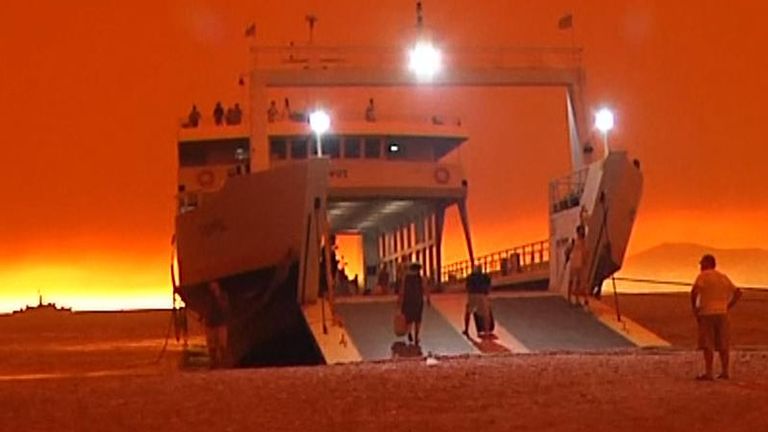
VIDEO Sky burns orange as Greek fires force evacuations
From Greece to California, the summer has seen wildfires rage in several places around the world, with lives lost and thousands evacuated.
In Europe, where some officials have blamed climate change for the large number of fires, blazes have burned in several countries, from Italy to Greece and Turkey.
Massive fires also have been burning across Siberia in northern Russia for weeks, forcing the evacuation on Saturday of a dozen villages. In all, wildfires have burned nearly 15 million acres this year in Russia.
'Disaster movie' in Greece
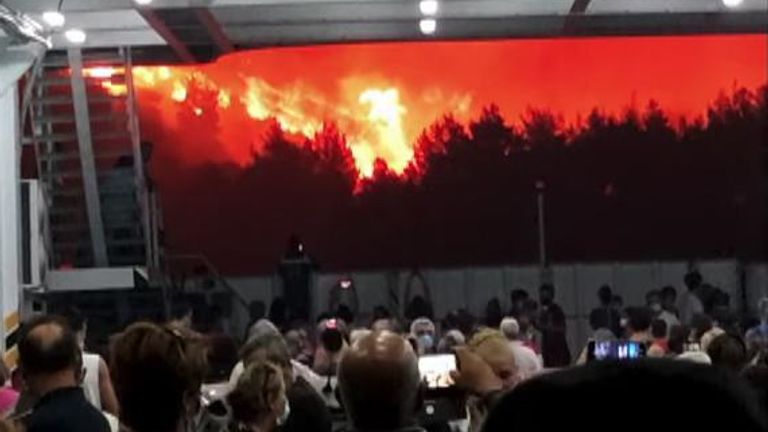
Play Video - Residents flee Greek island engulfed in flames
Thousands of people have fled wildfires burning out of control in Greece, including near the capital, Athens.
In dramatic scenes, residents and holidaymakers alike had to be ferried out of the island of Evia, the country's second-largest, as all other escapes were blocked.
The fire on Evia started on 3 August and cut across the popular summer destination from coast to coast, burning out of control for five days.
Patrol boats, navy vessels, a ferry and fishing and private boats are on standby to carry out more potential evacuations from the seaside village of Pefki, on Evia.
The conditions on the island were particularly tough for the water-dropping planes and helicopters, with pilots facing "great danger" with limited visibility, air turbulence and wind currents from the fire, said Civil Protection chief NIkos Hardalias.
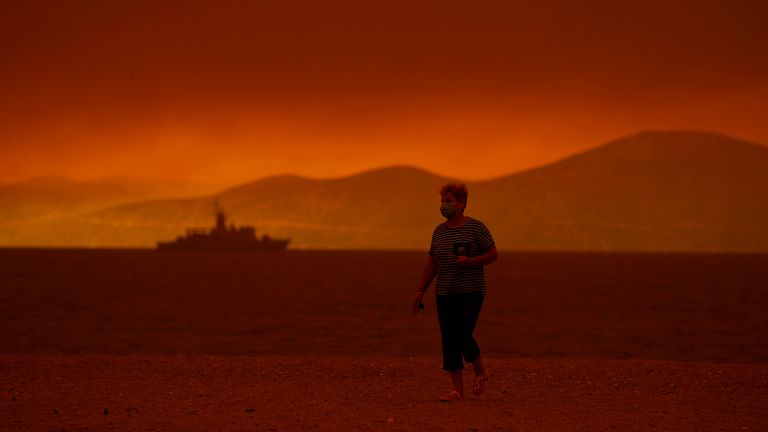
Elini Myrivili, chief heat officer in Athens, likened the fires raging in Greece to a "disaster movie". She welcomed the "wonderful" international support, as a team of British firefighters today arrived to help.
British firefighters are expected to land in Greece later Sunday to help battle the fires.
Hundreds of firefighters have been battling the blazes, fuelled by bone-dry conditions after the country's worst heatwave in decades, which sent temperatures soaring to 45C (113F).
At least 20 people have been treated in hospital for fire-related injuries, including two firefighters who were in intensive care.
Turkey's worst fires in a decade
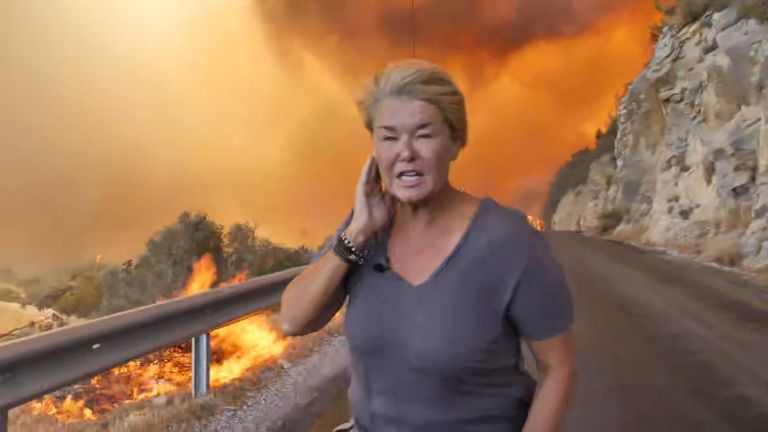
Play Video - Sky reporter at edge of Turkey wildfires
Fires in Turkey have killed at least eight people, including a volunteer who was carrying drinking water and other refreshments to firefighters in Marmaris.
The blazes have also killed countless animals, destroyed acres of forests near the country's favourite tourist destinations, and forced thousands of evacuations.
They have been described as the worst in at least a decade.
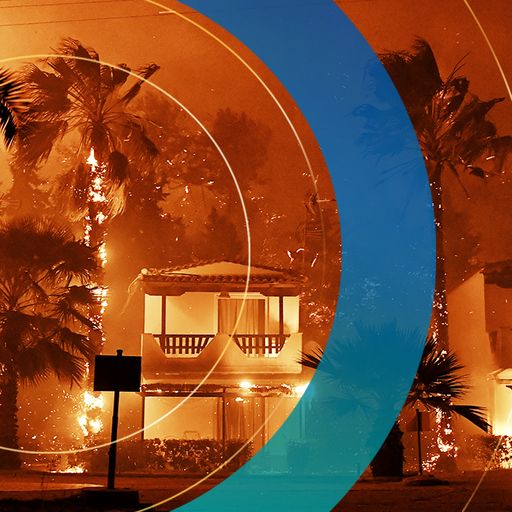
How heat dome has sparked worst wildfires in a decade across parts of Southern Europe
The fires in the country's southern and south-western coasts have been fuelled by a summer heatwave, low humidity and strong winds.
Two killed in Italy as Sicily declares state of emergency
In Italy, two people were killed in the southern Calabria region, a 53-year-old woman and her 34-year-old nephew. They were reportedly trying to save their olive trees.
Sicily has declared a state of emergency to last six months as fires burn through the island.
Temperatures are expected to soar in coming days, and could reach 45C (113F) in parts of Italy.
Biggest single California wildfire engulfs Greenville
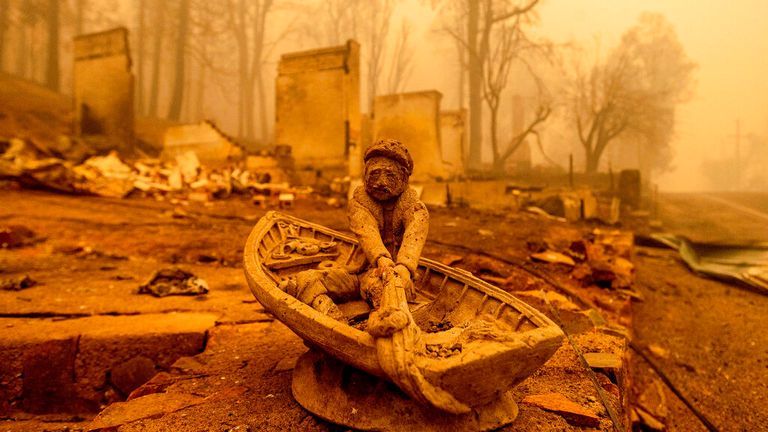
Fuelled by strong winds and bone-dry vegetation, California's Dixie Fire has grown to become the largest single wildfire in the state's history.
The Gold Rush town of Greenville has been destroyed, with its estimated 800 residents told to evacuate before the blaze tore through the town.
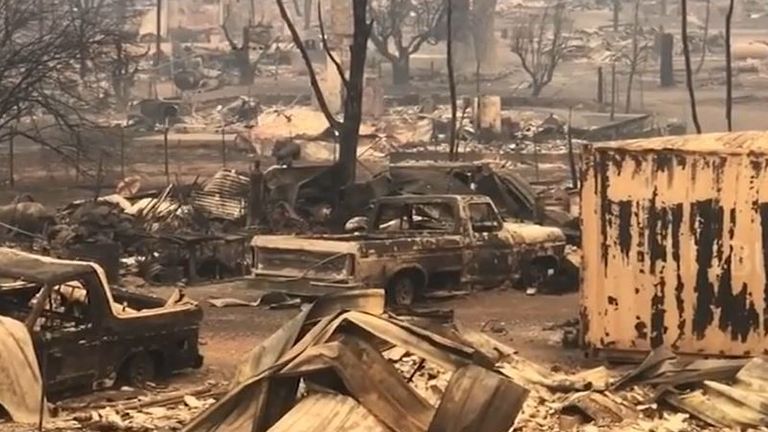
Greenville is destroyed by fire, which has been raging for three weeks
The Dixie Fire, named after the road where it started in Sacramento, covered an area of 700 square miles (1,813 square kilometres) on Saturday night, with just 21% of it contained contained, according to the California Department of Forestry and Fire Protection.
The fire has taken lives since it broke out on 13 July.
Siberian villages evacuated
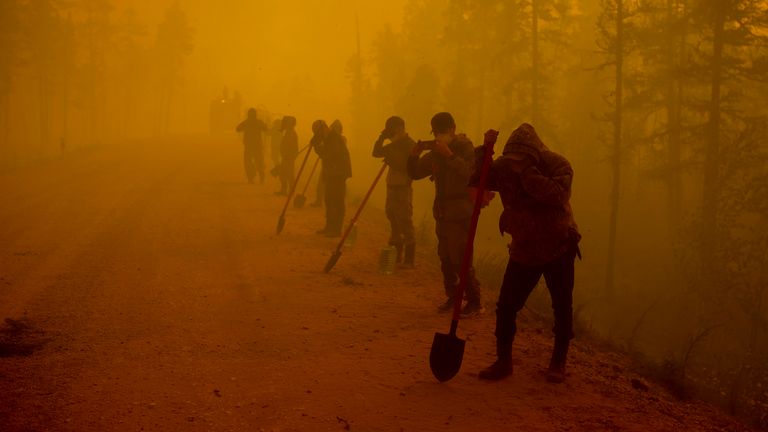
More than 150 active forest fires in Siberia are threatening a dozen villages, and two had to be evacuated at the weekend in a vast region of Siberia.
In recent years, Russia has recorded high temperatures that many scientists regard as a result of climate change. The hot weather - coupled with the neglect of fire safety rules - has caused an increasing number of fires.
Hundreds on Greek island of Evia flee homes as wildfires continue to rage
Issued on: 08/08/2021 -

Text by: NEWS WIRES
Hundreds of Greek islanders packed up their belongings and fled their homes on the Greek island of Evia on Sunday as wildfires continued to rage after a record heatwave.
Greece and neighbouring Turkey have been battling the devastating fires for nearly two weeks, with 10 people confirmed dead and dozens needing hospital treatment.
While rain brought some respite from the blazes in Turkey over the weekend, Greece continues to suffer a hot, dry summer.
"They burnt our paradise," 46-year-old islander Triantafyllos Konstantinos told AFP. "We are done."
The blazes have destroyed homes and reduced thousands of hectares of land to ash on Evia, Greece's second-largest island just northeast of the capital Athens.
Civil protection deputy minister Nikos Hardalias said a fire front in the north of Evia was being pushed by strong winds towards beach villages.
"We have ahead of us another difficult evening, another difficult night," he said, adding that 17 aircraft were helping to fight the fires on Evia.
However, fires in the southwestern Peloponnese region and in a northern suburb of Athens had abated, he added.
'In the hands of God'
The rugged landscape and dense pine forests on Evia that so appeal to tourists are helping to spread the flames and make the work of firefighters almost impossible.
Even waterbombing planes are struggling, with an official telling local media much of the water was evaporating before it reached the ground.
Hundreds of people have already fled the island and another 349 were taken to safety early on Sunday, the coast guard said.
In Pefki village, young people carried older and disabled people over the sand on to a ferry.
Elsewhere, villagers joined in the battle against the flames, helping firefighters.
"We are in the hands of God," 26-year-old Evia resident Yannis Selimis told AFP. "The state is absent. If people leave, the villages will burn for sure."
Local officials were critical of the efforts to control the fires, which erupted on the island on Tuesday.
"I have no more voice left to ask for more aircraft. I can't stand this situation," local mayor Giorgos Tsapourniotis told Skai TV on Saturday.
Many villages were saved only because young people ignored evacuation orders and stayed on to keep the fires away from their homes, he added.
Alexis Tsipras, leader of the main opposition Syriza party, said the government did not appear to be listening to local concerns about a lack of coordination and equipment.
"Is there a management plan? HOW LONG will this drama drag on?" he wrote in a tweet.
Local officials were struggling to shelter those forced to flee their homes.
Hardalias said on Saturday that provisional shelter had been provided to 2,000 people evacuated from the island.
'Trying times'
From July 29 to August 7, 56,655 hectares (140,000 acres) were burnt in Greece, according to the European Forest Fire Information System. The average area burnt over the same 10 summer days between 2008 and 2020 was 1,700 hectares.
Britain, France, Spain and other countries have answered Greece's appeal for help, and on Sunday, Serbia announced it was sending 13 vehicles with 37 firefighters and three firefighting helicopters.
Greek Prime Minister Kyriakos Mitsotakis thanked foreign countries for their help on Sunday.
"On behalf of the Greek people, I would like to express our heartfelt gratitude to all the countries that have sent assistance and resources to help fight the wildfires," he tweeted.
"We thank you for standing by Greece during these trying times."
Police said on Sunday they had arrested at least 10 people for arson, among them three young men in Pireaus for attempting to start a fire in nearby Perama.
(AFP)
By AFP
Published August 7, 2021
Firemen, assisted by local volunteers, fight to extinguish a wildfire in Oren in Turkey. — © AFP Kadir DEMIR
They grabbed their rakes, shovels and axes, donned high-vis helmets and went off into the mountains, helping exhausted firefighters battling Turkey’s deadly blazes pick their way through unfamiliar terrain.
Residents of the rolling hills and pine forests hugging the Mediterranean and Aegean coasts have turned into the unsung heroes of Turkey’s battle against its deadliest and most destructive wildfires in generations.
“You see that little fire over there? We will intervene and put it out right away,” Mehmet Yesimoglu, a 50-year-old shopkeeper, said proudly while pointing to a worrying patch of blood-orange flames.
“If we don’t, then it will grow and then we will need helicopters or planes.”
Turks have been watching in horror as huge pockets of some of the country’s most fertile land goes up in flames, turning to ash fields and valleys which farmers rely on for subsistence.
At least eight people have died and dozens of villages have been evacuated. Few know what — if anything — they will be able to return to when the fires finally subside.
But instead of feeling helpless, many joined the frontlines.
“This is not something we knew how to do before,” Tanzer Bulut, 30, said as he walked toward the smoke blotting out the horizon.
“All we do is try to be logical. You look where the flames are going and try to get ahead of them. We do what we can even though we are not professionals.”
– ‘I trust his knowledge’ –
Some of the locals give the firefighters directions, showing the best way to thread their way through winding roads that are often blanketed in smoke in the daytime and lit up by threatening, red flames at night.
One man stood on the side of the road, shining a clear path with the flashlight in his helmet, waving fire engines through with a stick.
Food and water donations have been pouring in from across the country to the point that one local official pleaded for Turks to stop — there was simply no place to store it all.
Others are helping the firefighters pull long, thick heavy hoses on their shoulders to the edges of the flames.
“To get a bulldozer through, I was able to show a clear path to the top without a problem, even though it’s steep,” said Hayati Zorlu, 55, a local village head in the Mugla province, which is home to popular Aegean resorts.
“Because I know the terrain and I am the only one here. There are no other officials except for the village chief.”
Hakan Karabulut, who heads an Istanbul fire brigade dispatched to the disaster zone, ran out of fingers on his hand listing all the ways locals have been able to help.
“First of all, they are our guides. Second, they show where to refuel with water. Third, they tell us where the fires are. Fourth, they provide us with logistical support, whether it’s food or drink. And fifth, they help us carry the fire hoses.”
But there was more, the fire chief said.
“We have youngsters here who are hunters and they know the territory very well. If I find him and I trust his knowledge, I don’t let him go.”
Read more: https://www.digitaljournal.com/world/villagers-become-unsung-heroes-of-turkeys-wildfires/article#ixzz731eU5hZc
Murder of the Dead by Amadeo Bordiga 1951 - Marxists
- When the catastrophe destroys houses, fields and factories, throwingthe active population out of work, it undoubtedly destroys wealth. Butthis cannot be remedied by a transfusion of wealth from elsewhere, aswith the miserable operation of rummaging around for old jumble, wherethe advertising, collection and transport cost far more than the valueof the worn out clothes. The wealth that disappeared was th…
- Undoubtedly, the size of the disaster along the Po has been massive,and the estimated cost of the damage is still rising. Let us admit thatthe cultivated area of Italy lost one hundred thousand hectares or onethousand square kilometres, about one three hundredth or three perthousand of the total. One hundred thousand inhabitants have had toleave the area, which is not the most densely settled in Italy, or, inround figures, one five hu


No comments:
Post a Comment